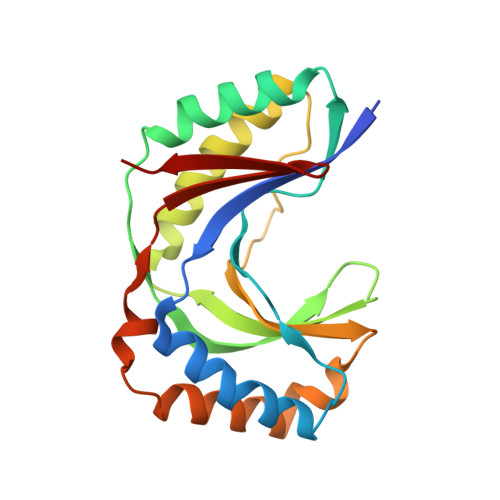Aberrant 3' oligoadenylation of spliceosomal U6 small nuclear RNA in poikiloderma with neutropenia.
Hilcenko, C., Simpson, P.J., Finch, A.J., Bowler, F.R., Churcher, M.J., Jin, L., Packman, L.C., Shlien, A., Campbell, P., Kirwan, M., Dokal, I., Warren, A.J.(2013) Blood 121: 1028-1038
- PubMed: 23190533
- DOI: https://doi.org/10.1182/blood-2012-10-461491
- Primary Citation of Related Structures:
4H7W - PubMed Abstract:
The recessive disorder poikiloderma with neutropenia (PN) is caused by mutations in the C16orf57 gene that encodes the highly conserved USB1 protein. Here, we present the 1.1 Å resolution crystal structure of human USB1, defining it as a member of the LigT-like superfamily of 2H phosphoesterases. We show that human USB1 is a distributive 3'-5' exoribonuclease that posttranscriptionally removes uridine and adenosine nucleosides from the 3' end of spliceosomal U6 small nuclear RNA (snRNA), directly catalyzing terminal 2', 3' cyclic phosphate formation. USB1 measures the appropriate length of the U6 oligo(U) tail by reading the position of a key adenine nucleotide (A102) and pausing 5 uridine residues downstream.We show that the 3' ends of U6 snRNA in PN patient lymphoblasts are elongated and unexpectedly carry nontemplated 3' oligo(A) tails that are characteristic of nuclear RNA surveillance targets. Thus, our study reveals a novel quality control pathway in which posttranscriptional 3'-end processing by USB1 protects U6 snRNA from targeting and destruction by the nuclear exosome. Our data implicate aberrant oligoadenylation of U6 snRNA in the pathogenesis of the leukemia predisposition disorder PN.
- MRC Laboratory of Molecular Biology, Cambridge, UK.
Organizational Affiliation:


















